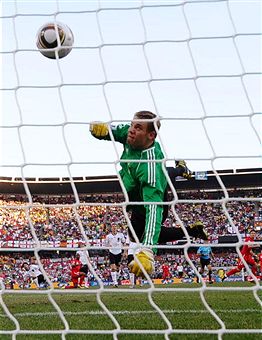I can still see the look of bemusement on the Brazilian journalist’s face.
It was in London a few years ago – in one of those expensive hotels along Park Lane.
Joseph Blatter, the FIFA President, had just explained the process by which the laws of football can be changed.
“So you mean to say,” the Brazilian journalist asked, still struggling evidently to grasp the enormity of what had been imparted, “that Wales has a hand in deciding the rules of the game but Brazil doesn’t?”
Shoot forward to the present day, and goal-line technology is once again a live issue.
Today, in the aforementioned Wales, the International Football Association Board (IFAB), the body that oversees the laws, will discuss the matter during its annual business meeting - though this is likely to be overshadowed now by events in Zurich.
A total of 13 companies, FIFA says, have approached it in relation to “their respective technology proposals”.
These companies had the opportunity of presenting their systems to FIFA earlier this month.
As England fans will no doubt recall, this hoary old issue was hoisted back towards the top of FIFA’s in-tray by Frank Lampard’s ‘goal’ that wasn’t in a crunch World Cup match against Germany in Bloemfontein in June.
As a result, I remain convinced that FIFA will have to implement corrective measures before the next World Cup in Brazil in 2014.
Knowing world football’s governing body, it wouldn’t altogether amaze me if the corrective measures involved sticking three or four tracksuited officials on a (sponsored) platform above the crossbar.
But corrective measures there will need to be.
What I want to focus on today though is the question of IFAB’s composition, which seems to me the true scandal in this long-running saga.
As things stand, there are eight votes when this 124-year-old body comes to make a decision – and a three-quarter majority of those present and entitled to vote is required for any law to be amended.
That, in itself, strikes me as a sensible provision: just as one needs to make sure that the rules can be changed when really necessary, one doesn’t want to make it too easy.
 But look at who has the votes!
But look at who has the votes!
The four British associations – representing England, Scotland, Wales and Northern Ireland – have one each.
And FIFA has the remaining four.
What is more, these FIFA votes are not allocated one by one for a number of years to readily identifiable individuals.
When I asked in the aftermath of Lampardgate which FIFA representatives were entrusted with the four votes, this is the relevant bit of the response I received from FIFA.
“There are no members by name of the IFAB.
“Each of the delegations can have several people in the meeting.
“Each of the British associations appoint their representatives each year for the meeting and FIFA appoints its representatives for the meeting.”
This unbelievably anachronistic system seems to me to:
a) discriminate unfairly in favour of the British, and against all other associations
and
b) leave the door open for FIFA’s top brass to appoint representatives who, it knows, all share its views, giving it an effective block vote amounting to 50 per cent of the total
To draw a comparison with a weightier realm, it is as if Simon Cowell gave himself three X Factor votes to his fellow judges’ one.
I am not one of those who knocks FIFA at every turn.
Under its tutelage, after all, football has achieved a position of utter dominance across the sporting world.
I am also British.
But this, truly, has to change.
We are in the second decade of the 21st century – football is no longer confined to the British Isles.
It is high time that IFAB’s credibility was restored by transforming it into a truly global repository of football wisdom, consisting of readily identifiable and respected men and women serving predetermined, probably three- to five-year terms.
Had this transformation been effected, as it should have, a generation or two ago, it seems plain to me that we would now have a far more reliable way of determining whether the ball crossed the goal-line in important football matches or not.
(And of course England would have seen off the Germans and gone on to lift their second World Cup.
OK, probably not that last bit.)
David Owen is a specialist sports journalist who worked for 20 years for the Financial Times in the United States, Canada, France and the UK. He ended his FT career as sports editor after the 2006 World Cup and is now freelancing, including covering the 2008 Beijing Olympics and 2010 World Cup. Owen’s Twitter feed can be accessed at www.twitter.com/dodo938

